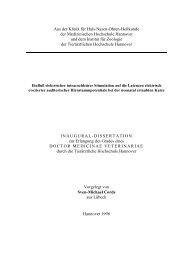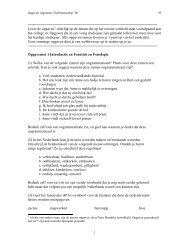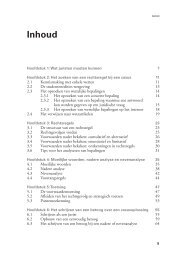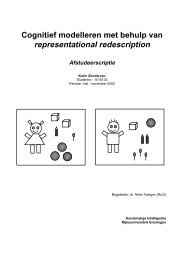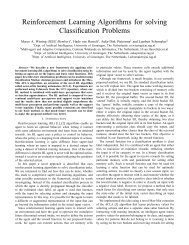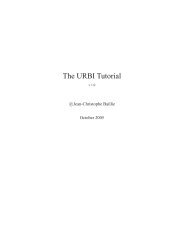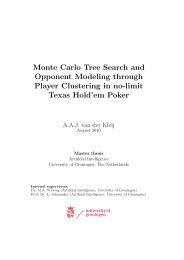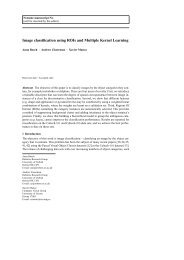Presuppositions in Spoken Discourse
Presuppositions in Spoken Discourse
Presuppositions in Spoken Discourse
You also want an ePaper? Increase the reach of your titles
YUMPU automatically turns print PDFs into web optimized ePapers that Google loves.
Chapter 5<br />
default <strong>in</strong>tonation also generally suggests that the presupposed <strong>in</strong>formation is<br />
background <strong>in</strong>formation to the assertional <strong>in</strong>formation, which is concerned with<br />
who knows what, with what degree of certa<strong>in</strong>ly. Geurts (2001) may be on the right<br />
track <strong>in</strong> argu<strong>in</strong>g that the notion of presupposed <strong>in</strong>formation as background<br />
<strong>in</strong>formation is somehow related to preferences for accommodation, because <strong>in</strong><br />
decontextualized examples <strong>in</strong>tonation suggests that presupposition is shared<br />
<strong>in</strong>formation and shared <strong>in</strong>formation will prefer to be globally accommodated. This<br />
tendency to be shared <strong>in</strong>formation is not uniform for all trigger types, or even for<br />
all presuppositions <strong>in</strong>duced by triggers with<strong>in</strong> the same group. For example, the<br />
above examples do not work as well when the factive is notice or realize, someth<strong>in</strong>g<br />
that should perhaps be addressed <strong>in</strong> more detail, but I hope that the examples<br />
above suffice to show that default <strong>in</strong>tonations for decontextualized examples may<br />
give mislead<strong>in</strong>g <strong>in</strong>tuitions about what type of read<strong>in</strong>gs are available, or are most<br />
natural.<br />
On the other hand, from section 5.2 we saw that many of the accommodated<br />
factives were used to communicate hearer-new <strong>in</strong>formation, though the majority of<br />
these examples were not embedded. In the follow<strong>in</strong>g example, the presupposition<br />
will not be globally accommodated because it would lead to an <strong>in</strong>consistent global<br />
context.<br />
(48) John is a baptist and a bachelor. He is conv<strong>in</strong>ced that his wife has to be a<br />
baptist too. That’s why he only dates girls from church socials.<br />
In conclusion, the type of data we exam<strong>in</strong>e is crucial when try<strong>in</strong>g to make<br />
conclusions about preferences. Us<strong>in</strong>g only data that has been removed of its<br />
contextual l<strong>in</strong>ks is go<strong>in</strong>g to give us an <strong>in</strong>complete picture of the situation. Examples<br />
<strong>in</strong> theoretical work on presupposition do show that global accommodation is<br />
preferred, but because these are decontextualized examples this sample is<br />
somewhat skewed.<br />
In the corpus there are differences <strong>in</strong> tendencies for different triggers to be<br />
<strong>in</strong>duced under embedd<strong>in</strong>g, regardless of the level of accommodation, though<br />
admittedly the number of examples is quite small. The ma<strong>in</strong> types of embedd<strong>in</strong>gs<br />
are negation, conditionals, hypothetical or modal contexts.<br />
First we can ask if all logical operators create embedd<strong>in</strong>gs that affect<br />
anaphoric accessibility <strong>in</strong> the same way. I don’t believe negation produces the same<br />
type of embedded context that other operators do and there is a higher tendency<br />
for global accommodation under negation than under other operators. Th<strong>in</strong>gs<br />
embedded under negation do not exist. Generally, we don’t discuss at length nonexistent<br />
th<strong>in</strong>gs when we don’t accept their existence. We do however discuss at<br />
length hypothetical states of affairs, objects, etc. Therefore I believe <strong>in</strong>formation<br />
<strong>in</strong>troduced under modal embedd<strong>in</strong>gs, and if-then clauses will have a greater ability to<br />
play an <strong>in</strong>dependent role <strong>in</strong> these embedd<strong>in</strong>gs than <strong>in</strong>formation <strong>in</strong>troduced <strong>in</strong> the<br />
scope of a negation operator, and this will affect tendencies to project out.<br />
144



